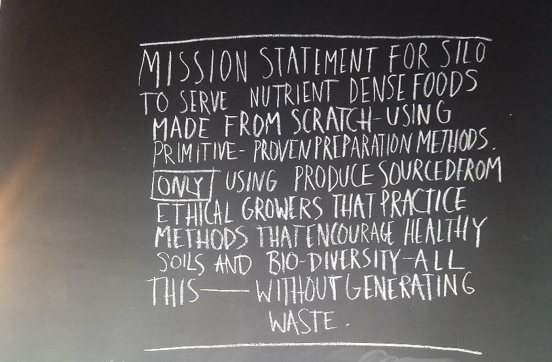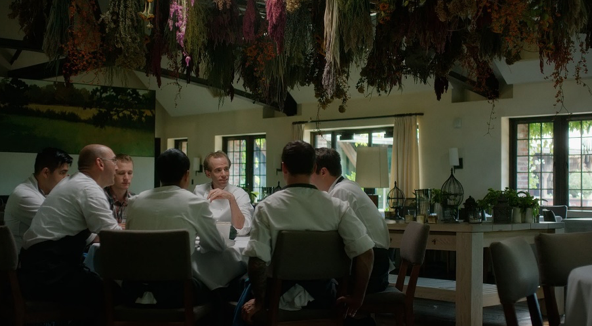This entry launches our new “Topics Affecting Our Community” series of thematic blog posts around issues impacting us at Sussex Global. This is the first post for February’s theme: Food and Culture. It is written by Anna Montanari, 3rd year student in International Development and Anthropology.
It is common to walk around, especially for those of us who live in Brighton, and see restaurants that display their choice of quality, tasty and unprocessed food. Their menus feature the local source of ingredients highlighting that vegetables are sustainable and organic, the chicken is grass-fed and the eggs are free-range. Farm-to-table restaurants have become powerful symbols for protests against a globalised and industrialised food system, and chefs play a key role in promoting sustainable production and consumption, and in bridging the gap between producers and consumers.

This worldwide trend of paying particular attention to quality, provenance of food and advocating for a closer relationship between food producers and consumers is particularly well-received among the majority of chefs across US.
It appears quite controversial since few large agribusinesses and transnational corporations have controlled the US market and concentrated a great economic power, while small non-competitive producers have been forced out of business. Other alienated producers have provided bulk commodities, which have been exchanged in national and global markets and sold below the cost of production in supermarkets. American consumers, who do not know the basic details of their food production, have been dependent on imported products and highly processed standardised fast food.
Far more than controversial, since the counter-cuisine of the 1960s and 1970s, some chefs have opposed and found solutions to the environmental and socio-economic problems of the agro-industrial food system by creating alternative markets, choosing to buy from local farmers and give their customers access to non-toxic nutritious meals.
In my Anthropology of Food’s dissertation, I analysed American chefs’ limitations on promoting alternative food in terms of an opposition and the contradictions in advocating for a reconnection between producers and consumers. I approached this in terms of two questions: do chefs’ strategies have a revolutionary potential to challenge the American industrialised food system? Are American chefs driven by self-interest or are they activists dedicated to a broader agenda? I argued that, even though food system ‘localisation’ could be a strategic pathway and have a transformative potential, chefs are neoliberal subjectivities who are driven by self-interest and use strategies of the neoliberal economy without challenging the conventional value chain.
Farm-to-table chefs’ strategies:
- Intimate relationships with farmers
Matt G., a chef from Tennessee, illustrates how interacting and forging an intimate relationship with producers at the local market are important aspects. When chefs treat farmers respectfully and appropriately, they receive great ingredients that enable them to cook successful meals in their restaurants. If guests like a dish, they will know where to find the best ingredients.

- Food stories
Through waiters, chefs give a story to their customers in order to make them aware of the importance of supporting farmers and their sustainable practices. For example, Dan Barber, who is the executive chef and co-owner of the top-tier restaurants Blue Hill and Blue Hill at Stone Barns in New York, spends a lot of his time acquainting the waiters with the story behind every item on the menu. When customers know about the origins of the food on their plate, they can appreciate it more and, eventually, change their eating habits.
- Alternative markets
Mikey Azzara’s Zone 7, which is a New Jersey’s growing zone and distributor of high quality products from organic and sustainable farmers in New Jersey and Eastern Pennsylvania, represents a great opportunity for both chefs and producers. Since Mikey Azzara has founded Zone 7 in 2008, the aim is to create an alternative market for farmers as an attempt to decrease the number of steps between farmers and consumers and support small organic farms, while chefs can have access to quality produce.
Both through stories and connections with farmers, farm-to-table chefs aim to reconfigure a dynamic totality, which is key to establish a sense of belonging and inclusivity, transcend the alienation and displacement of the industrialised food system, and ultimately take political action against the industrialised food system.
Articulating a critique:
- Federal regulations and neoliberal policies of free market might put pressure on farmers. Moreover, once chefs understand that sustainability is an important element of quality and success for their meals, they cherry-pick the best ingredients in the farm, therefore forcing farmers to grow expensive and ecologically demanding products. Chefs’ quest for flavour and search for variety might put further demand on small farmers.
It is evident that alternative markets are not absent of unequal power relations.
- Selling local and organic produce directly to restaurants is a way of doing business and mimics other forms of distribution provided by larger national distributors.
- Teaching people about provenance is not just good for local farmers but beneficial for the restaurant’s profit. It is a strategy to create a positive image and attract tourists, media and customers to return to the restaurant.
- Through food stories, chefs often singularise their ingredients by emphasising on the effort and energy that farmers invest in sustainable practices, the skills of growers to produce better quality products, and their intimate relations with farmers, turning local products into expensive commodities and therefore generating a profitable income.


Leave a Reply